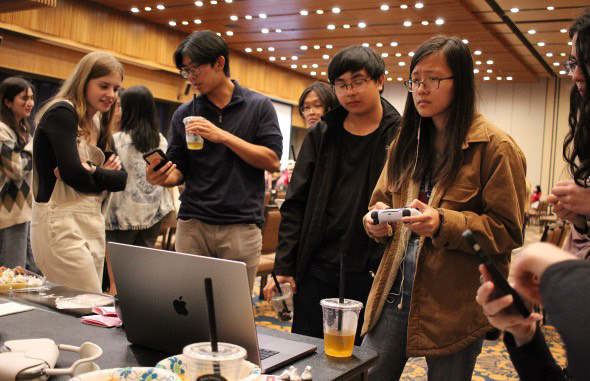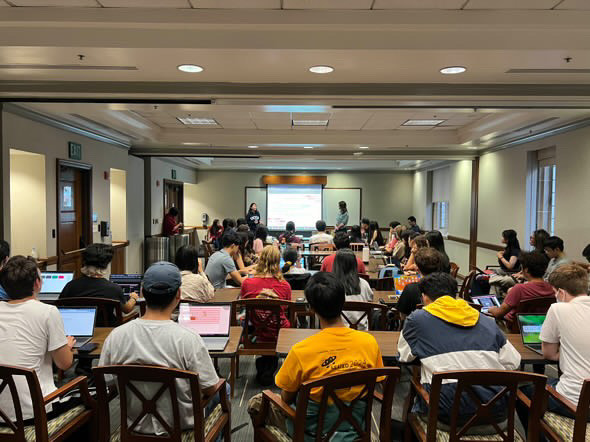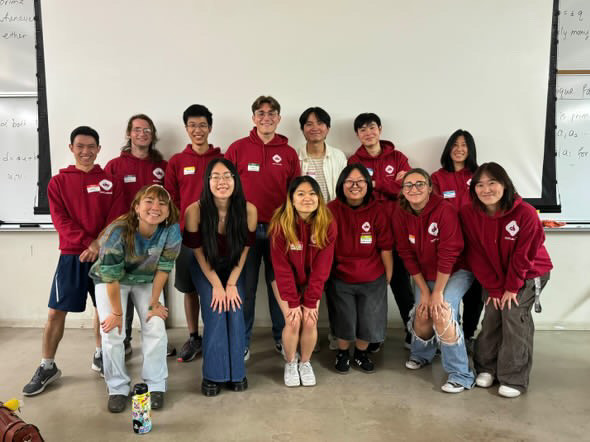ACM Studio makes game design accessible to all students
Shown are three students smiling at a laptop. ACM Studio is a student organization that aims to teach skills related to video game development. (Courtesy of ACM Studio)
By Alexandra Crosnoe
Oct. 19, 2024 3:19 p.m.
While some college students might enjoy playing video games, the ones in ACM Studio enjoy making them.
The student-run organization specializes in game development as a subset of the UCLA chapter of the Association for Computing Machinery, said fourth-year cognitive science student Faustine Wang, a senior advisor for ACM Studio. The club, which is open to students of all skill levels, hosts classes, guest speakers and social events surrounding game development, including a two-quarter program where students can design their own games, said fourth-year computer science student Aaron Kwan, who is also co-president of ACM Studio.
“We’re here to make it as easy and beginner friendly as possible,” he said. “We do this by providing a huge amount of resources and programs and events for people to develop games.”

[Related: Student-created Evyree app aims to help students find local discounts, save money]
ACM Studio hosts guest speakers whom club members can connect and network with, said fourth-year English student Nicolette Bond, who is also an officer of the organization. Kwan said this quarter, ACM Studio plans to host Scott Rudi, a former game design director at Riot Games, the development company behind “League of Legends.”
The club holds several teaching opportunities throughout the year, including workshops and a class in the engineering department, Kwan said. The class, Engineering 1GD: “Introduction to Engineering Design: Game Development in Unity,” is taught by ACM Studio officers, open to all engineering students and focuses on introductory game development, according to a post on the club’s Instagram account.
In addition to teaching opportunities, ACM Studio offers opportunities for hands-on experience in game development. One of the ways that the club facilitates interactive events is through its game jams, during which teams of students are given 48 to 72 hours to create a video game, Wang said. Game jams are open to people of all skill levels, Kwan said, adding that beginners often attend these events.
“We have 15 teams racing to make a game within a weekend, which is a lot of fun,” Kwan said. “Game jams are a good way to hop in and test out whether you like game development or not.”
Student Run Studios – a program where teams of 10 to 20 students create their own video games across two quarters – is the club’s flagship offering, Kwan said. ACM Studio offers the program during the winter and spring quarters and uses fall quarter to train its team leads to spearhead the project, he added. At the start of winter quarter, team leads will pitch their game ideas to roughly 200 students and then form teams based on these participants’ interests, he said.

Wang said the club creates a wide variety of games, including farming games, visual novels and a game that went viral called “UC Love,” where each character represents a UC school. Bond said they created a game that begins with players fishing around the world. However, as the game continues, the area where the player fishes begins to deteriorate, encouraging them to fish in a more environmentally friendly way, she added.
SRS culminates with a showcase, where teams present their creations to other participants in the program, Wang said. Out of all of ACM Studio’s events, Kwan said the showcase is his favorite experience, as it allows members of the club to share the projects they have worked on for the past two quarters.
“One of my favorite memories was at last year’s spring SRS showcase, where the teams all got to show off their hard work,” Kwan said. “Looking at everyone walking around, playing all the games, talking and laughing, and I was just thinking, ‘Wow, this is really, really cool.’”
ACM Studio primarily uses an engine called Unity, which assists in the game creation process, but the games’ custom functions and mechanics come from code that club members write, Kwan said. However, he added that the game development process requires far more than just experts in coding, emphasizing the need for each team to have members with a diversity of interests.
Beyond ACM Studio’s diversity in skill sets, Bond said the club has a wide-ranging group of academic interests, adding that the organization is not solely a place for computer science majors. While Bond is an English student, she added that ACM Studio is what convinced her to accept her admission offer from UCLA, as the club allowed her to participate in a game jam before she was an enrolled student. Anyone interested in game development is welcome at ACM Studio, Wang said.
“All majors are welcome, as long as you’re interested in or even just want to learn more or are curious about the game development process, you’re welcome to hop on by,” Wang said.
[Related: Video game preview: New releases this fall to bring excitement with remakes, series continuations]
Bond said the club has a very casual and social environment, hosting socials that include trips to Koreatown or Sawtelle. Leaders of the club also plan to initiate a new social program this quarter, grouping members together into “families” led by two officers, she added. Overall, Wang said the club serves as a way to meet like-minded students in an industry where it can be difficult to connect with new people.

“This shared space that we’re able to create is pretty important,” Wang said. “The biggest thing is a shared community that people can go to to meet people with the same goals.”
